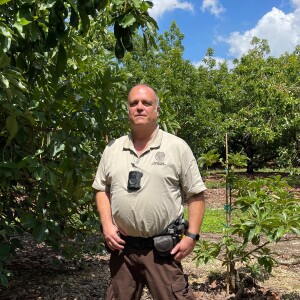Friday Jun 06, 2025
Sergeant with Miami-Dade Sheriff’s Office Agricultural & Environmental Crimes Section at Forefront of Protecting Vast Farmlands

By day, Miami’s agricultural district stretches like a sunlit tapestry—68,000 acres of fertile land where avocados, mangoes and other crops ripen in the heat. But when night falls, this rural expanse becomes a shadowy hunting ground. Under cover of darkness, produce poachers strike, sometimes making off with tens of thousands of dollars’ worth of fruit in a single sweep.
Patrolling this frontier is the Miami-Dade Sheriff’s Office Agricultural & Environmental Crimes Section, a small but specialized section led by people like Sergeant Richard Zahalka—a local son who knows the groves like the back of his hand. With a practiced eye for out-of-place footprints or a broken fence line, he protects the area not just with a badge, but with the instincts of someone raised among these orchards.
Sometimes, those instincts draw his attention to what others might ignore. A branch in the road might seem like random debris to most. But to Sergeant Zahalka, it could be a sign—a literal marker pointing toward theft.
“They’re organized,” he said. “They have guys go in, climb fences, pick avocados and leave them in piles. Then they leave branches in the road, so when the van comes later to pick them up, the driver knows exactly where to go.”
Produce poaching is difficult to detect. During harvest season, the groves are thick with vegetation. There are no streetlights, no porch lamps—just pitch blackness. The perfect cover.
Sergeant Zahalka keeps a photo on his phone from one case several years ago. Thieves had overloaded a 15-foot box truck with avocados. The suspension collapsed under the weight, and the vehicle was abandoned in an orchard. When the farmers returned the next morning, they opened the truck to find tens of thousands of dollars’ worth of fruit inside.
In response, many farms have built high berms to keep trucks out. But even that isn’t foolproof. Poachers have been known to dig out sections of berms, cut through fencing, and slip in undetected. Farmers now often use surveillance cameras—many of which Sergeant Zahalka can access from his phone.
The relationship between the Sheriff’s Office and the growers is close, and critical. The Dade County Farm Bureau—the county’s oldest and largest agricultural organization—honored Sergeant Zahalka as its Agricultural Officer of the Year at its 45th annual barbecue in April. He was also named Officer of the Year by the South Dade Chamber of Commerce for his work protecting local farms.
“He’s very involved, and probably knows every farmer out here,” said Jocelyn Guilfoyle, the bureau’s executive director. “There are only a few officers out here, so we truly appreciate what he’s done—and continues to do every day. He knows everything that’s going on and is always dedicated to helping resolve issues.”
Sometimes resolving those issues means reading intent. Deputies can issue civil citations or escalate to felony theft charges, depending on the case.
“We get folks who pull over and pick tomatoes or what have you,” Sergeant Zahalka said. “And then we get those who take steps to hide themselves, go in deep and fill up their vehicles.”
In more serious cases, deputies must proceed with caution. Large-scale theft operations can pose serious risks. In one recent incident, the ringleader of a theft crew was found carrying a loaded handgun.
Since joining the Agricultural and Environmental Crimes Section in November 2013, Sergeant Zahalka has worked a wide range of cases. He helped break up a guava theft ring, led the arrest of a suspect who was stealing and slaughtering horses for meat, and investigated a property owner who kept 220 animals in deplorable conditions. That owner was arrested, and the animals received treatment for malnutrition and other health problems.
In March, Sergeant Zahalka was named the Miami-Dade Sheriff’s Office Distinguished Deputy of the Month—an internal honor that he accepted with humility.
“It’s almost embarrassing,” he said. “Because this is something I love doing. I think you have to have a passion for it.”
His knowledge of agriculture continues to deepen, not just through work and conversations with growers, but through coursework offered by the University of Florida’s Institute of Food and Agricultural Sciences (UF/IFAS). He’s taken classes on composting, grafting, irrigation and more.
The Agricultural Section also includes an Agricultural Investigative Unit that handles a range of cases: thefts from nurseries, stolen farming equipment, pilfered portable fuel tanks, and the slaughter of horses for their meat.
But for Sergeant Zahalka and his colleagues, the mission in Miami’s farmland remains clear: protect the harvest, the land, and the livelihoods that depend on both.
Larry Dunagan, a life-long local farmer, and a member of the board of directors for the Dade County Farm Bureau, said that Section has always responded to the needs and concerns of the local farming community, and he praised Sergeant Zahalka for his vigilance.
“Definitely he pays attention to what’s going on out here, he knows the farmers, he knows the crops, and the seasons,” said Mr. Dunagan, who grows avocados and pole beans. “He’s very involved and he’s devoted a lot of time and effort to know the industry and to know the people involved and what they do and when they do it.”
No comments yet. Be the first to say something!